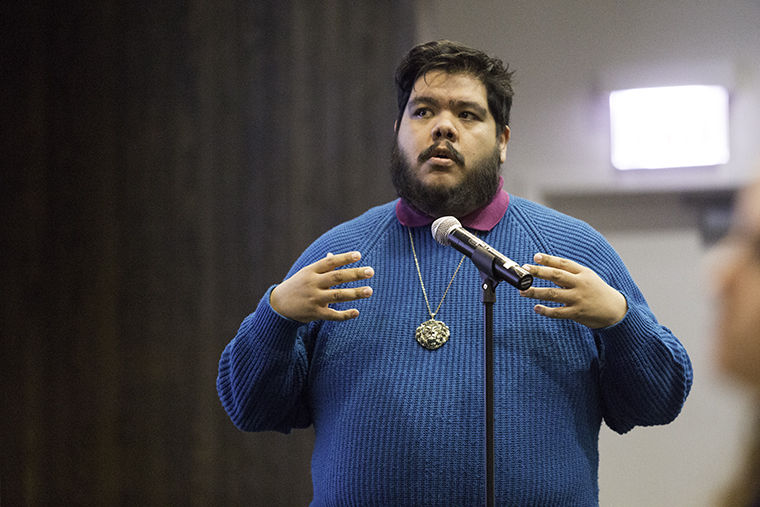Campus community gives input on core curriculum
March 6, 2017

Kyle Heger, junior cultural studies major, spoke to curriculum committee chairs about the value of student voice in administrative changes at a proposal forum on Feb. 27.
During a Feb. 27 college assembly, students, faculty and staff voiced concerns, provided ideas and gave feedback about a recent proposal for a new core curriculum.
Steven Corey, interim dean of the School of Liberal Arts and Sciences and chair of the Columbia Core Curriculum, and Suzanne Blum Malley, senior associate provost and chair of the Integrated First-Year Experience Committee, led the assembly, at Stage Two of the 618 S. Michigan Ave. Building.
Senior Vice President and Provost Stan Wearden attended and introduced the assembly.
Student and faculty comments made during the forum will be incorporated into a revised draft of the curriculum proposal, which will be offered to the Academic Affairs Committee a Faculty Senate on April 1, according to the proposal’s executive summary.
As reported Feb. 20 by The Chronicle, the proposal outlines changes to the college’s core curriculum, including the implementation of two new courses titled “Creative World,” which would be required for transfer students, and “Business, Technology and Communication,” which would be required for all upperclassmen.
According to the executive summary of the proposal, students will also be required to take 15 credit hours of 2000 level or higher courses, as opposed to the current six, and six credit hours that fall under a new diversity, equity and inclusion category.
Although many faculty and staff members were vocal participants, only a handful of students attended, with just one student speaking during the assembly.
Kyle Heger, a junior cultural studies major, spoke about the importance of student engagement when making collegewide changes.
“We don’t always have an access to the student mind, their body and their soul,” Heger said. “If we’re able to use this as a stepping point to see where we want to go in Columbia’s future, one step would be getting to the source itself: the students.”
Corey said the changes will not affect any currently enrolled students and suggested that more students would have attended the assembly if the proposals were to go into effect sooner.
Following the event, Corey told The Chronicle that no other assemblies have been scheduled to gather feedback on the proposal, but the committees are working with the Student Government Association to develop additional ways to gather student opinions. Online forums have also been created to elicit feedback.
During the open forum segment of the event, faculty and staff members spoke to committee chairs about the removal of the speech class requirement; the advantages and disadvantages of the Big Chicago courses; the expected timeliness of student graduation after the changes are implemented; and a policy that restricts classes taken for the core from being credited to the major requirements.
Nate Bakkum, associate chair of the Music Department, asked the committee if the new core requirements, when major requirements, could present a challenge to a student’s graduation time.
“The Core Committee felt that this was certainly within reason to start off by saying everyone should have the same number of credits within the core, the same experience, with the expectation that departments would be adjusting their credit levels as well,” Corey said in response. “That’s a very good point to make because we want to make sure that students graduate; that’s the most important thing.”
Louis Silverstein, Humanities, History & Social Sciences associate professor, brought up the importance of the first-year experiences of students, including those of his own children who attended Columbia.
“In terms of students [and] the first year experience, I’ve known both my son and daughter said what attracted them was that right away they could do what they wanted to do,” Silverstein said at the assembly. “They were able to really engage their passion and their interests.”
After the assembly, Blum Malley told The Chronicle she appreciated the questions and feedback on the proposal because that is why the meeting was held.
“We got some excellent suggestions and some really good food for thought as we move forward,” Blum Malley said.







